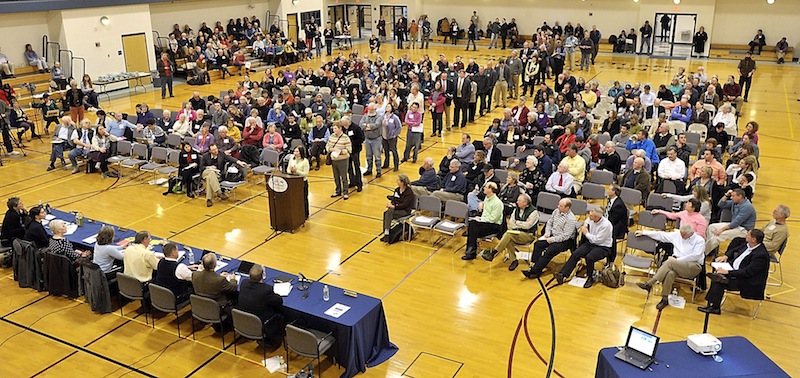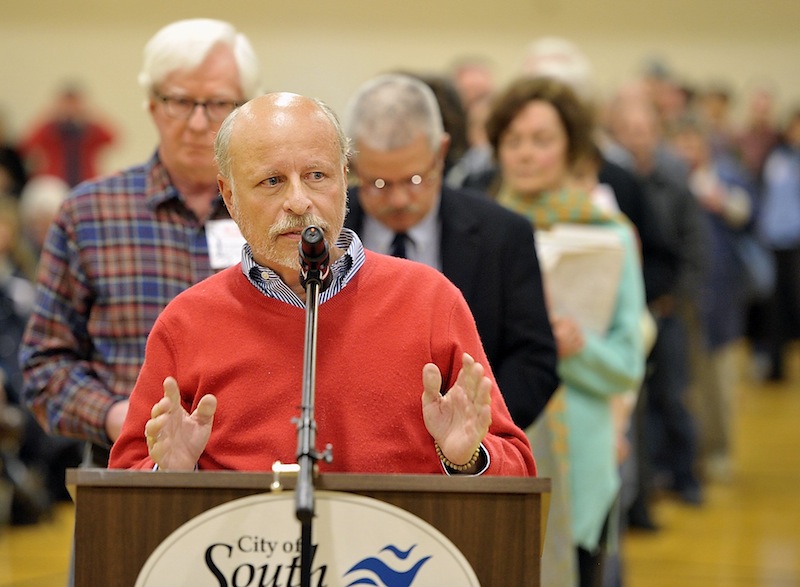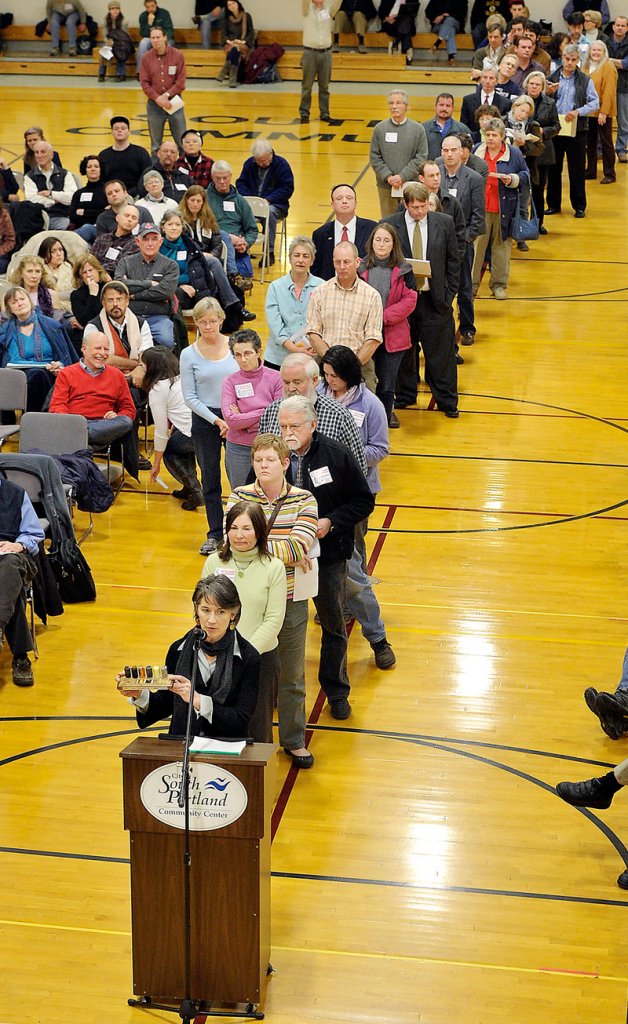SOUTH PORTLAND — Residents from around the Portland area sent a clear message at a workshop held by the city Monday evening to learn more about transporting the heavy crude known as tar-sands oil: They respect the fine record of Portland Pipe Line Corp. but don’t want the pipeline to move the oil through their communities.
Most of the people who filled the community center’s gym expressed fears that included a greater risk of fouled waterways and polluted air. Such consequences are inevitable, environmentalists said, if the pipeline begins pumping tar-sands oil from western Canada to Portland Harbor.
There are no plans now to do that. But Portland Pipe Line acknowledges that it would welcome the opportunity, as a way to boost sagging business. It insists that the product could be moved safely, just like the millions of barrels of heavy crude from overseas that it has pumped for decades.
Portland Pipe Line operates a marine terminal, tank farms in South Portland and Montreal, a system of pump stations and two underground lines.
Since 1941, crude oil has been unloaded from ships in Portland Harbor and pumped to refineries in Montreal, 236 miles away in Canada’s province of Quebec.
But shifting overseas market prices and an abundance of oil in Alberta have heightened interest in reversing the flow.
Concerns that the reversal would involve tar-sands oil have prompted more than three dozen forums or votes on local resolutions in communities across northern New England that are bisected by the pipeline.
The sessions have been orchestrated by environmental groups including the Natural Resources Council of Maine, Environment Maine and 350.org, which are part of an international campaign aimed at blocking further extraction of tar-sands oil in western Canada.
Opponents say that burning more oil from the massive deposits will release huge amounts of carbon dioxide into the atmosphere, speeding and worsening climate change.
The groups have galvanized local support by highlighting potential backyard disasters. Charging that tar-sands oil is more corrosive than conventional crude, activists have raised fears of a greater risk for pipeline accidents that are harder to clean up.
Those fears were realized on July 26, 2010, when a pipeline carrying tar-sands oil ruptured near Kalamazoo, Mich., and the spill wasn’t stopped for 18 hours.
At Monday’s workshop, Dylan Voorhees, clean energy director for the Natural Resources Council of Maine, showed slides of the polluted Kalamazoo River. Cleanup continues, with costs exceeding $1 billion.
That could happen to Sebago Lake or its tributaries, he indicated, if a spill happened here.
Voorhees also showed a digital image of 70-foot stacks that he said would be needed at the Portland Pipe Line dock to vent toxic vapors associated with transportation of tar-sands oil. People in the audience received a handout from the Natural Resources Council with a similar photo-illustration. Many also accepted tags that read: “No tar sands in South Portland. Stop the smoke stacks.”
Voorhees’ presentation ended with sustained applause and a standing ovation.
It was a tough act to follow for representatives of the pipeline company and its allies.
Patrick Binns, Canadian consul general to New England, spoke of the importance of Canadian energy exports. Despite the growing role of renewable energy, he said, oil will remain a critical resource for decades and Alberta has the third-largest proven reserves in the world.
New technology is reducing the impact of extracting that oil, Binns said, with current greenhouse gas emissions on par with other sources of heavy-oil production.
John Quinn, executive director of the New England Petroleum Council, called out Voorhees for failing to mention the positive findings of the recent draft environmental impact statement on the proposed Keystone XL pipeline, which would connect Alberta and Gulf Coast ports.
The U.S. State Department noted that tar-sands oil is the same as conventional crude, and any risk of spills would be rare and small.
Quinn’s comments touched off catcalls from the audience, leading South Portland Mayor Tom Blake to ask the crowd to show respect for the speakers.
Quinn also told participants that 70 percent of Maine’s gasoline comes from a refinery in Saint John, New Brunswick. If they drove to the workshop, he said, chances are their cars ran on tar-sands oil.
Following Quinn, pipeline officials laid out how they now safely handle, monitor and test oil that flows through the pipeline. Tar-sands oil would be no different, they said.
Larry Wilson, the company’s president, said that with market conditions in flux, the company must pursue new opportunities. He vowed to keep the community informed about any changes that might be pending.
When it came time for questions, a line of 40 people formed behind the podium. Most had misgivings, both global and local, about tar-sands oil.
Frederick Lancaster of South Portland spoke of the world’s coming climate crisis and the need to move beyond petroleum. Bob Foster of South Portland agreed, and worried about an oil spill hurting the city’s waterfront.
Among the few voicing other opinions was Bill Van Voorhis of South Portland, supervisor of rigging and marine operations for Cianbro Corp. Van Voorhis said he has worked on inspection projects and other jobs involving Portland Pipe Line. The company has the strictest safety practices in Portland Harbor, he said, and he’s confident that it can move tar-sands oil safely.
Monday’s forum won’t lead to any immediate action by the City Council.
Similar meetings have led to a series of votes along the pipeline’s path. Voters in Casco, Bethel and Waterford have approved resolutions opposing the transport of tar-sands crude through their communities.
In Raymond, however, selectmen voted 3-2 last week against a resolution meant to tighten the federal government’s environmental review of tar-sands oil transportation. The matter is expected to come up again in April, as the town gets more information.
Tux Turkel can be contacted at 791-6462 or at:
tturkel@pressherald.com
Send questions/comments to the editors.







Success. Please wait for the page to reload. If the page does not reload within 5 seconds, please refresh the page.
Enter your email and password to access comments.
Hi, to comment on stories you must . This profile is in addition to your subscription and website login.
Already have a commenting profile? .
Invalid username/password.
Please check your email to confirm and complete your registration.
Only subscribers are eligible to post comments. Please subscribe or login first for digital access. Here’s why.
Use the form below to reset your password. When you've submitted your account email, we will send an email with a reset code.